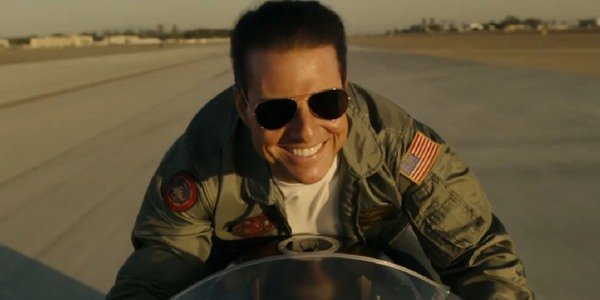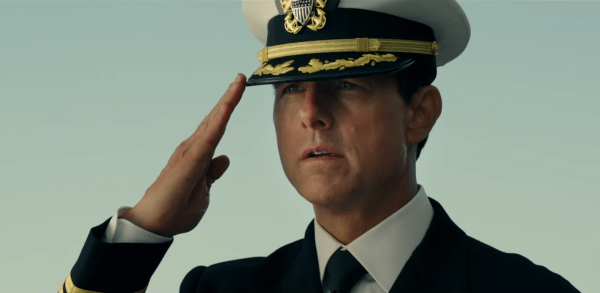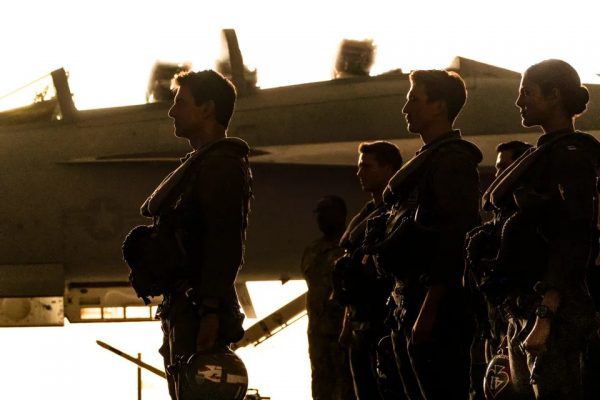Wesley Stenzel on Tom Cruise’s self-aware movie stardom in Top Gun: Maverick…
About twenty minutes into Top Gun: Maverick, a disheveled Tom Cruise is surprised to find himself in the most generic American diner imaginable. It’s filled with featureless white bread normal people who gaze upon his tattered otherworldly figure with amazement and disgust. Cruise can no longer walk among mere mortals, for his perfectionist movie star ego is writing checks that relatability can’t cash. It’s been so long since he resembled a regular person that he can’t pretend to be one anymore, so instead all of his recent movies are, in one way or another, about being a movie star.
After all, Cruise is the last of a dying breed, so it’s fitting that Maverick is his most emotional acknowledgment of his unique stature in our new starless Hollywood. We still have big-name celebrities and quality actors, of course, but in the franchise era, nobody new has risen to the household name status of a Julia Roberts, a Denzel Washington, or especially a Tom Cruise –– marquee names that’ll draw crowds for whatever project they line up next, thanks to powerful charisma and reliable, carefully-honed star personas that they uphold or subvert with each subsequent performance (maybe you could make an argument for Dwayne Johnson or Ryan Reynolds here. But can you confidently claim that an average American grandmother knows who either of those guys are, let alone name any of their movies?) Maverick functions as something between a celebration and a eulogy for Cruise’s singular stardom while also providing exemplary blockbuster action and moving character drama.
The film begins with Cruise’s Pete Mitchell, who’s exclusively referred to by his titular call sign Maverick (because Cruise could never believably play someone named Pete), up against a wall. He’s test piloting new aircraft for the government, but it’s immediately clear that he’s a relic from a bygone era. He’s about to be shut down because everyone else doing what he does for a living has been replaced by slicker, smoother unmanned machines that can theoretically do everything a traditionally-piloted plane can, but quite can’t replicate the instinct or personality of a remarkable human at the helm. Maverick’s pushing his body and his equipment to the brink of self-destruction for the advancement of the medium despite the increasing risk factor. He’s the only one brave, committed, or crazy enough to keep on keeping on. “You know what’ll happen to you if you go through with this,” warns a colleague. “I know what’ll happen to everyone else if I don’t,” Maverick responds. Cruise’s messiah-of-cinema complex is somehow even more apparent here than in his leaked rant from the Mission: Impossible 7 set where he claimed that “the future of this fucking industry” lies on his shoulders, and while his intensity and inflated sense of self-importance might be off-putting, it’s difficult to claim he’s wrong when no one else is rising to the occasion.
It’s only after this introductory sequence that the Top Gun-iness of it all really kicks into gear. Maverick gets called back to his California alma mater to teach a new group of hotshots how to execute an impossible mission –– basically an earthbound Death Star run in an anonymous enemy country that’s never detailed enough to ruffle any geopolitical feathers. What follows is not a beat-for-beat remake of the 1986 original, but a ridiculously-improved story that captures your memory of its predecessor’s essence. It has everything you remember –– astounding aerial combat photography, greased-up beach athletics, a swelling synthesizer score –– but executed with a technical precision and narrative focus that the original film sorely lacks. Unlike other aging stars in legacy sequels like Harrison Ford in Star Wars: The Force Awakens and Sylvester Stallone in Creed, however, Cruise refuses to take a backseat to the new cast. The film hinges on Maverick’s relationships –– and Cruise’s ability to perform –– with three crucial supporting characters: his old flame Penny (Jennifer Connelly), his rival-turned-friend-turned-superior Iceman (Val Kilmer), and his estranged surrogate son Rooster (Miles Teller).
The Maverick-Penny relationship gets far less attention than his fling with Kelly McGillis’ Charlie from the first film, but it’s much more natural and sweepingly romantic. Age has conferred a certain ruggedness and wisdom to both Cruise and Connelly, and their quiet, longing gazes communicate much more than pages of clunky banter ever could in 1986. Their fling is fairly chaste and mature, dealing in tender late-night chats and extensive clothed embraces. Perhaps that’s because Cruise knows audiences still probably aren’t comfortable with him as a sex symbol nearly two decades after The Couch torpedoed his every last shred of conventional attractiveness. But it’s lovely nonetheless to see two charming, beautiful people over the age of 50 enjoy each other’s company and uplift each other through shared adventure and commitment.
Iceman’s presence is shorter-lived but still profoundly impactful. Medical complications have reduced Kilmer’s range of vocalization, but the film embraces his present abilities by providing him with a simple conversational scene that cherishes his every word and microexpression. He’s the emotional anchor of the movie – Cruise’s ability to reconnect with a beloved 1986 castmate gives him the space to more vulnerably unravel Maverick’s emotions, as the inherent sense of shared experience adds poignance to their renewed on-screen partnership. It’s here that Cruise solidifies Maverick as his most compelling dramatic performance since 1999’s double header of Magnolia and Eyes Wide Shut: for the first time in a very long time, he naturally expresses genuine self-doubt, fear, and remorse that his stony Great Action Men never have the chance to explore. It’s the most natural and least self-conscious he’s felt in years.
And Rooster. Sweet, sweet Rooster. He’s Goose’s orphaned son, and he looks disconcertingly like Anthony Edwards, complete with an anachronistic porn ‘stache. Miles Teller is a difficult performer to get excited about because he plays exhaustingly irritating characters so convincingly, so when he’s doing a good job you want to punch him in the face –– and when Maverick asks him to be earnest, innocent, and likable, it’s almost shocking when you realize he’s actually capable of that. A more basic, thoughtless version of this movie would fill his character with hatred toward Maverick for letting his dad die, but this one complicates their relationship by hanging their conflict on a much later slight, allowing for an implication of many warm, loving years before the relationship soured. Rooster gives Maverick a worthy sparring partner, a child to protect, and, effectively, an embodied ghost of Goose. Cruise’s character has to stare a manifestation of past failure in the face, inspiring a tormented, anxious disposition that subsequently makes their eventual reconciliation all the more cathartic. It provides the poetic, emotionally-fulfilling conclusion that the original film refused.
We may never see a star as committed as Cruise again, so it’s thrilling to witness him continually reflect on his persona. He might only play one note, but he plays it better than anyone. “I don’t like that look,” a concerned colleague tells Maverick near the beginning of the film. Cruise shrugs. “It’s the only one I’ve got.”
Wesley Stenzel – Follow me on Twitter and Instagram @wesleystenzel

















